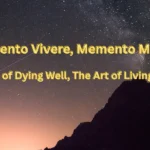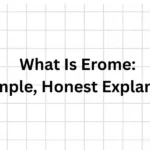There’s something strange about how we live. We go through our days planning, striving, worrying — as if we’ve got all the time in the world. And yet, deep down, we know that isn’t true. Life is fragile. Temporary. But we don’t like to talk about that part.
Still, for centuries, people have turned toward two Latin phrases to remind themselves of something essential:
Memento Mori — “Remember that you must die.”
Memento Vivere — “Remember to live.”
Two sides of the same coin. One facing death. The other, life.
It sounds somber at first. But if you sit with these phrases long enough, they don’t bring dread — they bring clarity. They strip away noise and force us to ask, “What really matters?” And maybe more importantly, “What doesn’t?”
This is an article about both. About living better. And about dying well.
Memento Mori: Why Remembering Death Makes Life Sharper
In today’s world, we go out of our way to avoid thinking about death. We hide it behind hospital curtains, bury it in euphemisms, and distract ourselves endlessly so we don’t have to face it. But that wasn’t always the case.
In ancient Rome, victorious generals were said to have been followed by servants whispering in their ears: “Memento Mori.” No matter how powerful you became, you were still mortal. Still human. Still going to die. That reminder wasn’t meant to shame them. It was meant to humble them. To keep perspective. To help them live wisely.
The Stoics practiced this intentionally. Seneca, Marcus Aurelius, Epictetus — they all wrote about it. Not to be grim, but to sharpen their awareness. To strip away illusions. If today were your last day, what would matter? Would the argument you had this morning still sting? Would that promotion feel as urgent?
In a strange way, remembering death helps us live with more purpose. It reminds us: we’re not promised tomorrow. And that can either scare us… or wake us up.
Memento Vivere: Don’t Just Avoid Dying — Choose to Live
It’s one thing to remember death. But that only has meaning if it leads us somewhere — toward life. That’s where Memento Vivere comes in.
Most people aren’t afraid of dying. They’re afraid of not having truly lived.
Think about it. We rush. We stress. We put things off. We spend so much of our time either chasing something or numbing ourselves from something else. And in the process, we miss out on being present. We forget to be alive — fully, deeply, consciously.
Memento Vivere is a reminder to stop and breathe. To listen when someone’s talking. To taste the coffee. To take the long way home sometimes. It doesn’t mean chasing thrill after thrill. It means noticing the ordinary and realizing it’s not so ordinary after all.
The Art of Dying Well
Most of us don’t want to think about how we’ll die. But many cultures throughout history believed that the way you face death matters. It’s not just something that happens to you — it’s something you prepare for, spiritually, emotionally, even practically.
In Japanese culture, the Samurai practiced seppuku, not out of self-destruction, but out of honor. In Buddhism, practitioners meditate on impermanence. In Christianity, saints often wrote about the “good death,” one marked not by fear, but by peace.
What does it mean to die well in our time?
Maybe it means tying up loose ends. Saying the words that have gone unsaid. Living with enough awareness now that, when the time comes, we don’t feel cheated — because we didn’t waste the time we had.
To die well, perhaps, is simply to not be surprised when the moment arrives.
The Art of Living Better
If Memento Mori teaches us to respect time, and Memento Vivere teaches us to cherish it, then the real art is putting the two together.
Living better doesn’t mean overhauling your life overnight. It doesn’t mean quitting your job and moving to Bali (though maybe for some it does). It means aligning your choices with your values. It means waking up and not sleepwalking through the day.
It’s the small stuff — the tone you use with your loved ones. The time you spend (or waste). The way you treat yourself.
Living better isn’t a performance. It’s a shift. A quiet, often invisible, commitment to presence.
Slowing Down to See Clearly
The problem with modern life is speed. We fill every second. We multitask like it’s a virtue. But when you move that fast, it’s hard to reflect. Hard to feel. Hard to see.
Memento Vivere is like a gentle tap on the shoulder saying, “Hey, look up. Don’t miss this.”
We don’t need grand moments to feel alive. We just need to notice the ones already happening.
That laugh over dinner. That morning light on your window. That quiet moment when you’re alone with your thoughts and nothing’s demanding your attention.
They’re there. Always have been.
A Personal Practice, Not a Slogan
It’s easy to treat phrases like Memento Mori or Memento Vivere as trendy tattoos or motivational quotes. But their real power is in how you live them.
Try this: once a day, pause and ask, “If today were my last, would I be okay with how I’m spending this moment?”
You don’t have to change everything. You just have to live more on purpose.
And when you do — when you remember that life is brief, but also beautiful — you start to see differently. You stop wasting time on things that don’t matter. You start saying what needs to be said. You become more patient. More awake. More real.
Final Thoughts: Two Reminders, One Life
Memento Mori. Memento Vivere.
One tells you that your time is limited. The other tells you to make it count.
Together, they’re not grim. They’re grounding.
We don’t get to choose how long we’re here. But we do get to choose how we show up while we are. Whether we live with our eyes open or closed. Whether we run from death or walk beside it — and learn from it.
And maybe that’s the most honest kind of wisdom: to accept our ending, and in doing so, finally begin to live.
You might also like to read
What Is Erome: A Simple, Honest Explanation
Quantum Superposition: Being in Two Places at the Same Time
DEI Meaning: What Diversity, Equity & Inclusion Truly Signify












